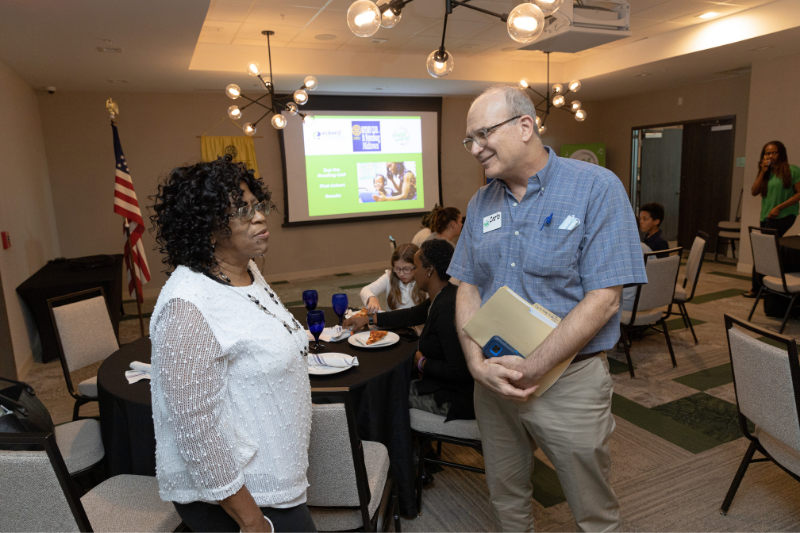St. Petersburg Midtown Rotary Club President Paulette Jones and Sing Out and READ co-founder and Executive Director Carlo Franzblau celebrated the achievements of elementary school children who complete the 12-week Family Literacy Project program on Nov. 4.
BY DEXTER MCCREE, Feature Writer
MADEIRA BEACH — Sing Out and READ (SOAR), the St. Petersburg Midtown Rotary Club, and Eckerd Connects joined together to celebrate the achievement of elementary children who completed the 12-week reading program Family Literacy Project (FLiP).
FLiP uses a fun and unique sing-to-read method to improve reading levels, focusing on students of color in Pinellas County.
The Cambria Hotel on Madeira Beach hosted the awards program and celebration to acknowledge the students who achieved tremendous gains in their reading level. The youth honored on Nov. 4 averaged more than 1,500 minutes of reading over the 12-week session.
SOAR co-founder and Executive Director Carlo Franzblau shared with the audience that there is approximately a 30 percent difference in the reading levels of Black students and non-Black students, with no measurable progress being made in the last five years.
Franzblau stated that similar gaps exist in reading achievement for Hispanic youth, low-income students, and foster children.
“We have got to do something different in order to make a difference in our children’s education, and it starts with reading,” said Franzblau. “I am so happy to partner with people, organizations, and businesses who invest in our children’s reading.”
The FLiP program lends a specially configured tablet to low-income families that have a struggling reader in the home, targeting first through fifth graders. A large part of the program’s effectiveness is due to how it disguises learning through gamification.
The special device is meant for home use. The FLiP tablet has a cellular connection so that children can access the program anywhere and anytime. Each session is 12 weeks, with students committing to complete 90 minutes per week.
When a student achieves 900 minutes, they earn a new high-quality tablet that is theirs to keep. SOAR has found that more than two-thirds of children who start the all-volunteer program complete it. Struggling readers move up one full reading grade level in just three months.
The St. Petersburg Midtown Rotary Club sponsored 10 foster children who worked diligently on improving their reading levels. According to Franzblau, foster children were selected to participate in the program because they have a higher absenteeism rate than their peers and are three times more likely to drop out of high school.
In the Tampa Bay area, there are approximately 6,000 foster children in Pasco, Pinellas, and Hillsborough counties alone.
“It really takes a village to raise a child,” said St. Petersburg Midtown Rotary Club President Paulette Jones.
Students should be reading on grade level by the third grade; however, two-thirds of children nationwide cannot read at this stage. A high proportion of at-risk children are of color and from low-income households. Children who can’t read are four times more likely to drop out of high school.
Franzblau reported that 85 percent of juvenile offenders have difficulty reading, and 70 percent of incarcerated adults cannot read at a fourth-grade level. Bringing all adults to the equivalent of a sixth-grade reading level would generate an additional 2.2 trillion dollars in annual income for the country.
Reading well promotes racial equity by narrowing the reading gap between Black students and their counterparts.
To sign your child up for the program, visit www.singoutandread.org.
To reach Dexter McCree, email dmccree@theweeklychallenger.com








